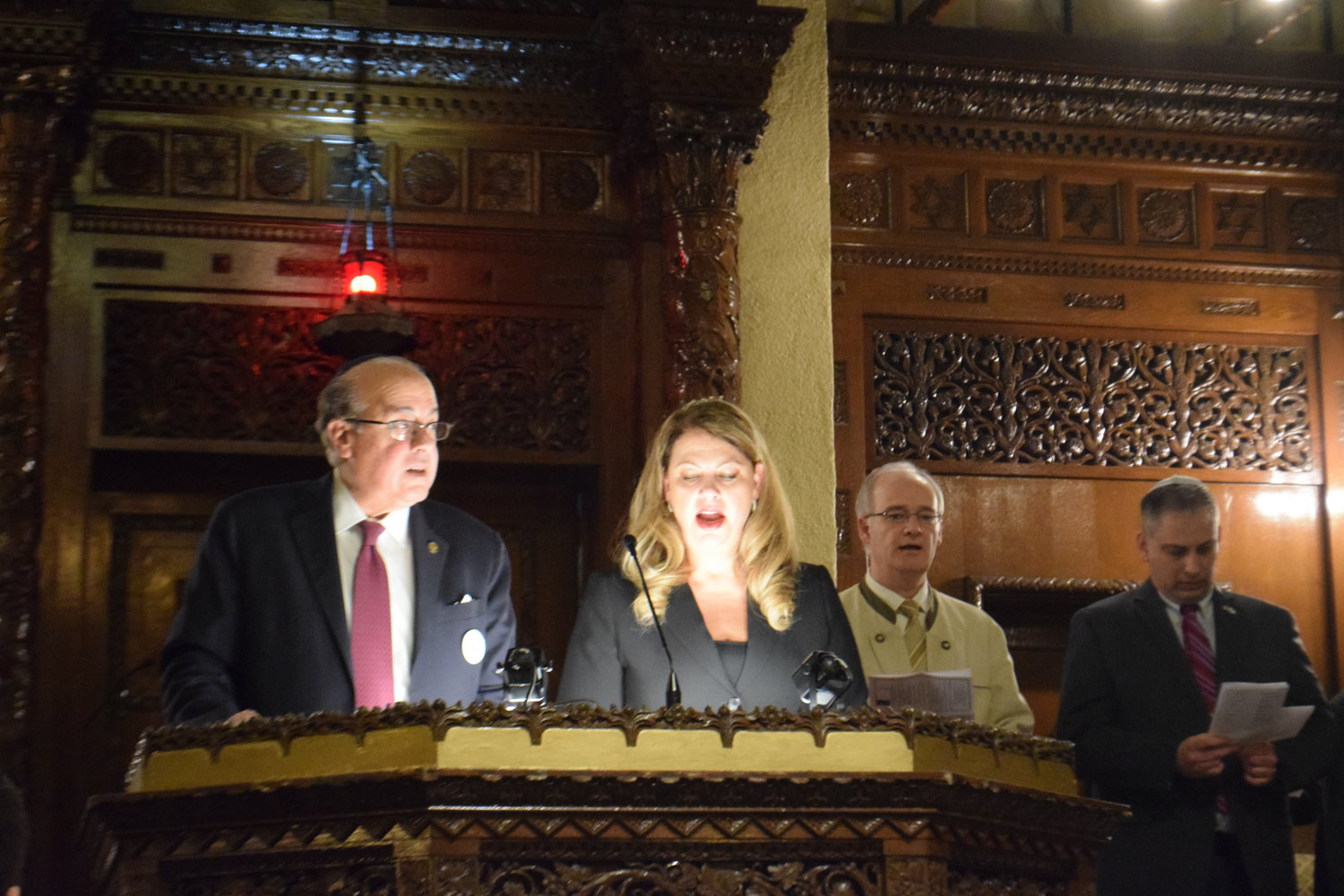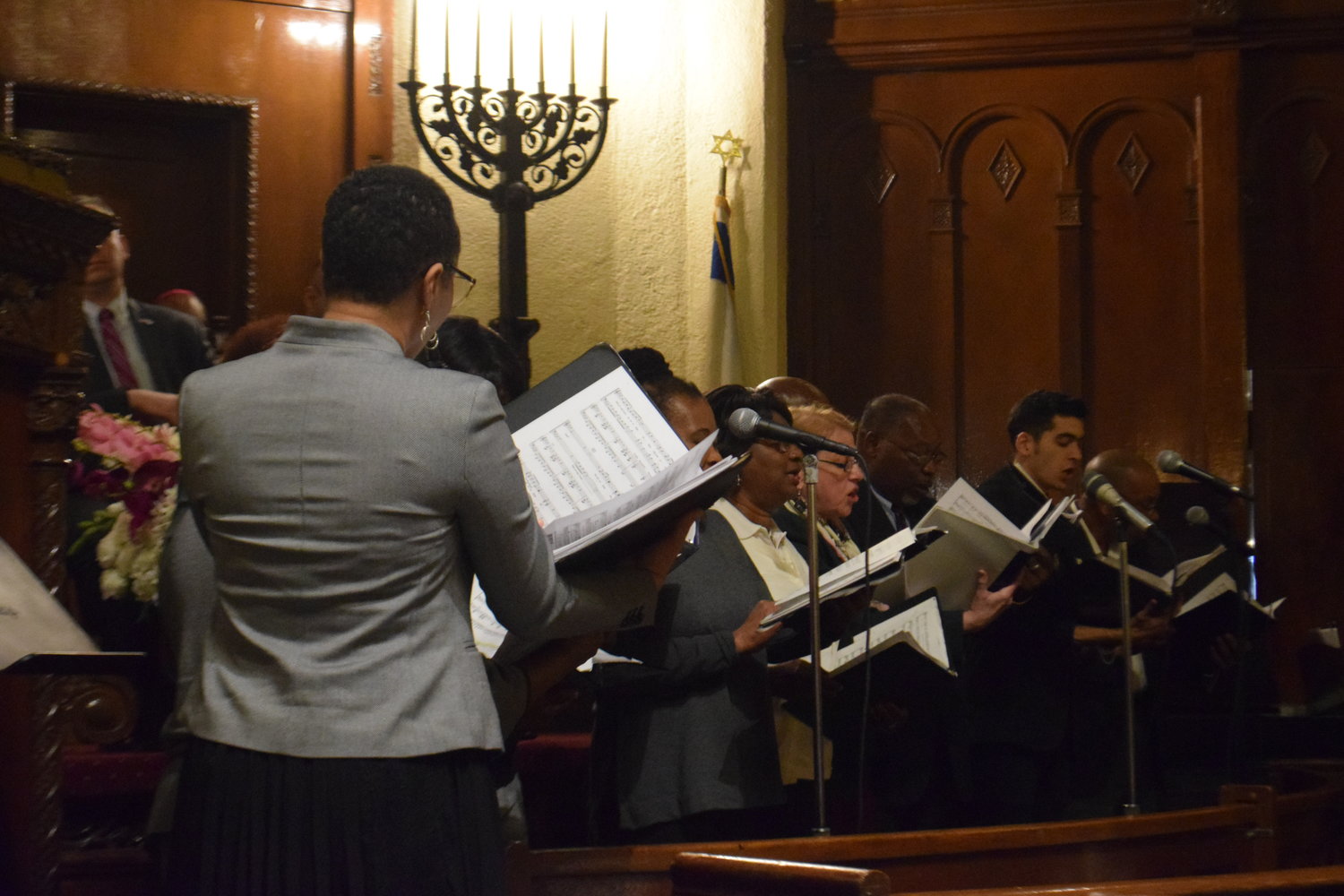Diverse groups join forces at Temple Israel of Lawrence
The messages shared at the 18th annual Rev. Dr. Martin Luther King Jr. and International Holocaust Remembrance commemoration at Temple Israel of Lawrence came from diverse voices, however the perspective was identical — working together is the way to bridge the cultural, ethnic and religious divide.
Coming on the heels of MLK Day and the 75th anniversary of the liberation of Auschwitz, the more than two-hour Jan. 30 event encompassed Christian bishops, Jewish rabbis and a Muslim leader, along with representatives from three countries and musical performances.
Rabbi Jay Rosenbaum, the leader of Temple Israel, presided as emcee. He noted that it is up to everyone to battle the anti-Semitism, the racism and xenophobia that has emerged, once again, in the past few years. “Don’t look to the statehouse or to the schools, look to the house next door that’s where the answers lie,” he said.
A member of the Nassau County District Attorney’s Faith Advisory Council, Rosenbaum quoted council Chairwoman Sylvia Finkelsten, on a way to possibly create a better world. “Love each more and judge each other less,” he said.
Recounting the day as an 8-year-old that Bishop Lionel Harvey first head that King was assassinated, the pastor at First Baptist Cathedral of Westbury, said he ran downstairs to share the sad news with his parents. Weaving together phrases from Abraham Lincoln, the Declaration of Independence and King, Harvey urged audience members to do what is right. “The time is always right to do what is right,” he said, quoting MLK.
“I’ve made it my life’s mission to help people navigate this journey we call life,” Harvey said, adding he makes a point of visiting the Lorraine Motel in Memphis, where MLK was killed. “No one takes the time to listen … take the time to listen.”
Calling the Jews killed in the Holocaust the “six million heroes” Dr. Isma Chaudhry, board chairwoman of the Westbury-based Islamic Center of Long Island, called for coming together as one community to fight hate. “These are trying times and we have to be each other’s keepers,” she said. “May prejudice be removed from our hearts.”
Temple Hillel Rabbi Steven Graber said that one of his teachers, Rabbi Abraham Heschel, marched with King. “Both of our communities know what it’s like to live without freedom,” Graber said. “Many African-Americans, folks who are here today, are descendants of slaves who had no rights in this country. Only 75 years ago, Jews who were slaves laborers of the Nazis got their emancipation. We formed the NACCP together, we fought for equality in the military together, we marched for equality in society together, and shall continue to walk together as brothers and sisters.”
Israel’s Deputy Consul General Israel Nitzan quoted writer and noted Holocaust survivor Elie Wiesel’s take on indifference. “We all share this goal of bringing forth the light and joining forces to stand up for what is right, and we must unite in our fight against racism, against hatred, against anti-Semitism,” Nitzan said, in highlighting King’s legacy.
Rabbi Joseph Potasnik, executive vice president of the New York Board of Rabbis, shared that 22 years ago a young woman arrived in the United States, came to his office in Brooklyn, and said she wanted to remain here, but she didn’t have any of the required paperwork. The synagogue sponsored Galina Makaveyev. “She became the cantor of your synagogue,” he said.
“We all have to stand in solidarity,” Potasnik said. “Anyone who is deemed different has to be protected by us standing together.”

 44.0°,
Mostly Cloudy
44.0°,
Mostly Cloudy 







